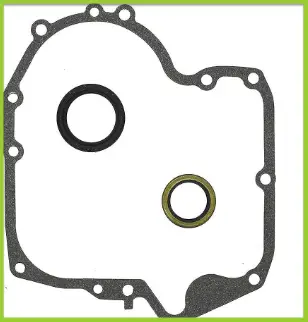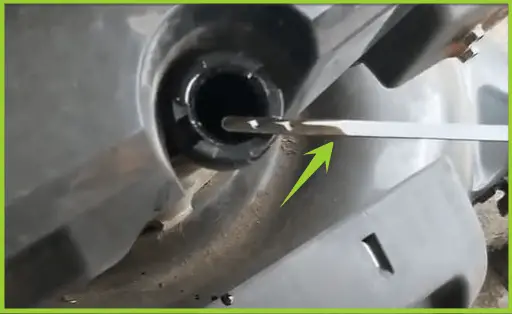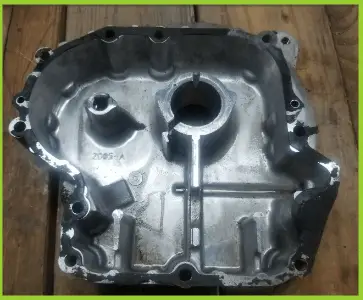In the world of small engines, Briggs and Stratton is a renowned name. These engines power a wide range of equipment, from lawnmowers to generators.
However, if you’ve noticed your Briggs and Stratton engine leaking oil from the bottom, it can be a cause for concern.
In this comprehensive guide, we’ll delve into the various causes of oil leaks, offer practical solutions, and provide maintenance tips to keep your engine running smoothly.
Let’s get started.
Briggs and Stratton Leaking Oil From Bottom
1. Worn-out gasket or seal

Cause Explanation:
A worn-out gasket or seal is a prevalent cause of oil leaks in Briggs and Stratton engines. These gaskets and seals are designed to create a tight, secure barrier between different engine components, preventing oil from escaping.
However, over time and due to exposure to heat and engine vibrations, they can deteriorate.
Addressing the issue:
To address this problem, follow these steps:
- Identification: Carefully inspect the engine for signs of oil residue around gaskets and seals.
- Replacement: When identified, replace the worn-out gaskets or seals with new ones. Ensure you use high-quality replacement parts suitable for your engine model.
- Regular Maintenance: Make gasket and seal replacement a part of your regular maintenance schedule. This proactive approach can help prevent future leaks.
Read Briggs and Stratton Blowing Oil Out Exhaust(Causes and Solutions)
2. Overfilled Oil

Cause Explanation:
Overfilling the oil reservoir can lead to oil leaks from the bottom of the engine. When there’s too much oil, it creates excess pressure on the seals and gaskets, causing them to fail and allowing oil to escape.
Addressing the issue:
To resolve overfilling, follow these steps:
- Drain Excess Oil: Carefully drain the excess oil from the engine until it reaches the recommended level specified in the manufacturer’s manual.
- Check Oil Capacity: Always follow the manufacturer’s guidelines for oil capacity to prevent overfilling in the future.
- Regular Oil Changes: Stick to a regular oil change schedule as recommended in the manual. Clean oil reduces the risk of leaks and keeps the engine running smoothly.
3. Damaged Oil Pan

Cause Explanation:
A damaged or cracked oil pan can be another reason for oil leakage. The oil pan is located at the bottom of the engine and serves as a reservoir for engine oil. Physical damage to this component can lead to oil escaping.
Addressing the issue:
To address a damaged oil pan, consider these steps:
- Inspection: Carefully inspect the oil pan for cracks, dents, or other signs of damage.
- Professional Repair or Replacement: If you find any damage, it’s advisable to consult a professional mechanic. They can assess whether a repair is possible or if a replacement is necessary.
- Preventative Measures: To prevent future damage, be cautious when operating your equipment and avoid running over debris or obstacles that could harm the oil pan.
Read Briggs and Stratton 21 HP Platinum Engine Problems(With Solutions)
4. Loose or missing bolts
Cause Explanation:
Loose or missing bolts within the engine can create gaps and openings that allow oil to leak.
These bolts play a crucial role in holding the engine components securely together.
Addressing the issue:
To address loose or missing bolts, follow these steps:
- Thorough Inspection: Conduct a comprehensive inspection of the engine for loose or missing bolts.
- Tightening: When identified, tighten the bolts securely using the appropriate tools and torque specifications.
- Regular Maintenance: Include bolt inspection and tightening as part of your regular maintenance routine. This practice helps prevent future leaks and ensures the engine’s integrity.
Read Briggs and Stratton Auto Choke Bypass(Choke No More)
5. Engine Overheating
Cause Explanation:
Excessive heat can cause engine components to expand, potentially leading to oil leaks. Engine overheating can result from various factors, including a malfunctioning cooling system or prolonged usage in hot conditions.
Addressing the issue:
To prevent engine overheating and associated oil leaks, consider these steps:
- Cooling System Maintenance: Regularly inspect and maintain the cooling system, including the radiator, fan, and thermostat. Ensure they are functioning correctly.
- Proper Ventilation: Operate your equipment in well-ventilated areas and avoid using it in extreme heat conditions whenever possible.
- Monitor Engine Temperature: Keep an eye on the engine temperature gauge. If it consistently runs hot, investigate and address the underlying cooling system issues promptly.
Read Symptoms of Bad Ignition Coil on Lawn Mower(6 Commons)
Troubleshooting Briggs and Stratton Oil Leaks
Once you’ve identified the cause of the oil leak, it’s time to take action. Here are some practical solutions to address the problem:
1. Gasket and seal replacement
If worn-out gaskets or seals are the issue, replacing them with new ones is the best course of action. Regular maintenance should include checking and replacing these components.
2. Adjusting Oil Levels
To resolve overfilling, carefully drain excess oil to the recommended level. Follow the manufacturer’s guidelines for oil capacity.
3. Repairing or replacing the oil pan
In the case of a damaged oil pan, you may need to repair or replace it. Consult a professional mechanic for this task, as it involves complex engine work.
4. Tightening bolts
Inspect the engine for loose or missing bolts and tighten them appropriately. Regularly scheduled maintenance can help prevent this issue.
5. Cooling System Maintenance
Prevent engine overheating by maintaining the cooling system. Ensure that the radiator, fan, and thermostat are in good condition.
Read Kohler V-Twin Oil Leak(5 Quick Ways To Fix)
Maintenance Tips For Briggs and Stratton
To avoid future oil leaks, here are some maintenance tips for your Briggs and Stratton engine:
1. Regular inspections
Perform routine inspections of your engine for signs of oil leaks, loose bolts, or damaged components.
2. Oil change
Change the engine oil as per the manufacturer’s recommendations. Clean oil reduces the risk of leaks.
3. Use quality oil.
Always use high-quality oil suitable for your engine type and climate conditions.
4. Proper storage
Store your equipment in a dry and sheltered area to protect it from the elements, which can cause oil leaks.
5. Professional Servicing
Schedule professional servicing at least once a year to ensure your engine is in top condition.
Read Low Oil Symptoms in Lawn Mowers (Don’t Ignore These Signs)
Final Remarks
Dealing with a Briggs and Stratton engine leaking oil from the bottom can be a challenge, but with the right knowledge and maintenance practices, you can keep your engine running smoothly.
By addressing the root causes, following maintenance tips, and seeking professional help when needed, you can extend the life of your equipment and enjoy reliable performance.
FAQs
Can I use any engine oil for my Briggs and Stratton engine?
It’s essential to use the type of oil recommended in the manufacturer’s manual for optimal performance and to prevent oil leaks.
How often should I check for oil leaks in my engine?
Regular inspections, at least once a month during active usage, are advisable to catch and address oil leaks promptly.
Can I repair a damaged oil pan myself?
Repairing a damaged oil pan can be complex and is best left to a professional mechanic to ensure proper sealing and prevent future leaks.
What’s the consequence of ignoring an oil leak?
Ignoring an oil leak can lead to engine damage, decreased performance, and increased repair costs. It’s crucial to address it promptly.
Is it normal for engines to produce some oil residue?
Some oil residue can be normal, but excessive leakage is a cause for concern. If you notice a substantial oil leak, investigate and resolve it promptly.




